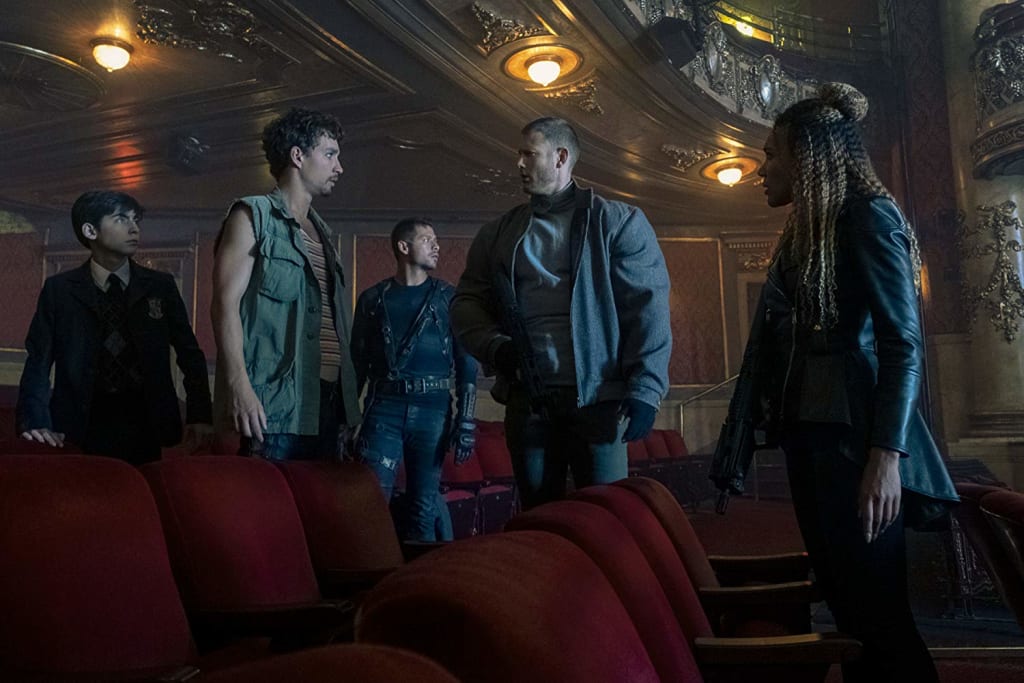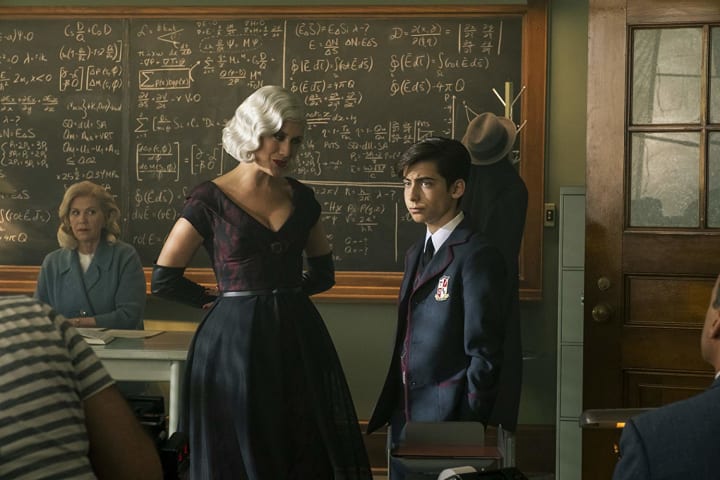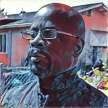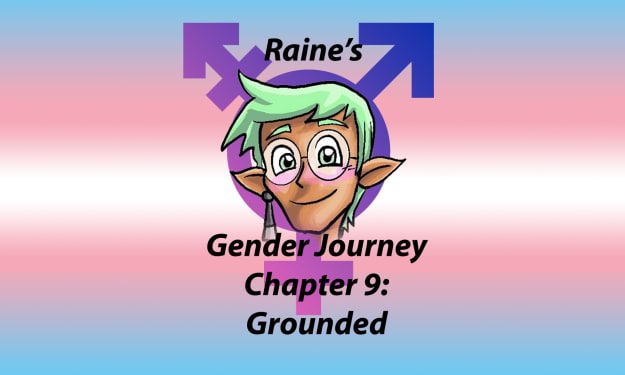I Didn't Like 'The Umbrella Academy' - Yes, I Said It.
Yes, it got a second season. But I won't be there.

There are thousands of articles out there singing the praises of The Umbrella Academy, an award-winning comic and superhero science fiction series, which appeared on Netflix in 2019. The television series was based on a Dark Horse comic, which first appeared in 2007 and won an Eisner Award (the Academy Award of comics) in 2008 for Best Finite Series/Limited Series.
I have not read the comics. I won't cast judgement upon them. YET.
But this article isn't going to be one of those glowing love-fests you can find anywhere on the internet. I did not like this series, and the reasons were things I just thought, as a writer, we didn't do anymore. I am a lover of the superhero genre and when you can get on my bad side, you are doing something seriously wrong.
In an effort to not spoil too much, I have left out a lot of details, but I suspect if you are a woman or person of color who watched this series, and found yourself wincing, you will understand what I am talking about. Watch it again with this in your mind, and you will see the series differently.
Number 1: Terrible Family Dynamics
The story was of a superhero team without any of the filial bonding, or responsible interaction one would expect from heroes who risked their lives to save each on a regular basis. They hadn't just met each other either. They had been doing this since they were kids.
- They fought about everything. Not in playful banter I expect from my super-teams, either. This was the juvenile, whiny and completely unattractive arguments you see happening in your local super-store, and you walk away and pretend you don't see it happening. I couldn't do that. I was paying to watch this faux drama.
- Worst than that was, it never improved. The characters didn't really experience any evolution through the entire series. The sum of their challenges in the series were built into this family flaw activating moment after moment of plot-induced stupidity.
- Yes, I get why it was done this way. To differentiate them from the group they most resemble, Marvel Comics X-Men. Mostly it made every scene where there were two of the Umbrella Academy team members together a long, drawn out argument, where nothing was discussed, and I would have been happier if they had just skipped right over it.
Number 2: Missed Story Opportunities
There were so many missed opportunities. Yes, I know they are working from an already existing comic series, but it is my firm belief not every comic translates into different media successfully. The Umbrella Academy might have been a winner on the page, but the televised series kept missing the mark.
- Being honest, I wanted to like it more. It had the potential to be an interesting and dysfunctional take on the X-Men or Doom Patrol. Both of those titles got by on the quirky nature of their superheroes. Super-kids sharing a birthday, born with super-powers, taken in by a reclusive madman, and raising them to be superheroes by utilizing their unique powers. Yep, standard superhero fare.
- I think the writers wanted to make the series more interesting, because of their dysfunctional relationships. Instead of being tight-knit, and loving and believing in each other, they are misbehaved, psychologically scarred, and highly dysfunctional, at the best of times.
- I felt this series was problematic in its racial depictions and numerous genre tropes, which were unevenly developed in the story. I have been reminded that this story is adapted from a comic where all the original protagonists were White. Would it have bothered me less if they were in this story as well? I can't be sure. But I had a problem with how the characters of color were treated, narratively speaking.
Number 3: Ragged Racial Representation
For me, watching a series where minorities are present, but not represented in terms of position, of power, agency or authority, acting solely as foils for other, more successfully presented White heroes using the same power, agency or authority for themselves, leaves me cold and unfulfilled. It's the same as if they hadn't been there at all.
- The character Cha-Cha (played by Mary J. Blige) is such a character. While she is presented as strong and capable and in most cases, the person in charge of the Commission's hit team, her character remains one-dimensional in the face of her partner Hazel's personal arc and eventual development.
- Why did Hazel get to have a life? Would it have killed them to give Cha-Cha a life, broadening her character arc? Yes, I recognize someone had to die in their twosome. My problem was, I could tell who it was as soon as Hazel made a connection outside of the team. Cha-Cha's demise was telegraphed from that moment.
- My real issue with this story is the idea that the issues I have pointed out aren't problems if you're a White viewer. This, in my opinion, is why the series is so popular. Every person who sang its praises in my circle were White. None of my friends who were people of color (or women) were nearly as pleased with it.
- From the perspective of my friends, the story is rich with characters who are dynamic, powerful and interesting with lesser minority characters who are outshined and routinely make mistakes. The Umbrella Academy treats this story as one more superhero saga in a world replete with them where White men are saving the day, again.
- I was taken aback by the fact there were no significant Black male superheroes present in this story. There are six superhero lead roles, with only one Black woman. I know there isn't a quota but it seemed like there was.
- Emmy Raver-Lampman was slotted into a role which made her a person of questionable morals (willing to use her power on her child) with the nature of her power being the ability to alter a person's mind. She was used in the story, primarily as eye candy, seen and not heard—at one point a literal condition in the story.
- Worse, her decision-making potential was undermined by her emotional connection, causing her to balk at a critical juncture. Emotionalism, a trait assigned to the women of this story, became a weakness.
Number 4: Second String Characters
I was annoyed with the undertone of the series because the characters of color (or any role having any degree of diversity) were relegated to secondary roles. They got less screen time, they never seemed as prominent and often acted as little more than props on the screen.
This sets up a host of expectations for me as a long-term viewer of science fiction on American television. If I had been playing "negative expectation" bingo, I would have certainly scored.- I expected minority characters to lose any interaction they are involved in, and to be sacrificed, physically, socially, or morally, for the sake of the story.
- I expected women to be overly emotional and balk in the face of getting the job done due to their emotional investment (even if such investment was the right thing to do) and the unspoken truth is presented as: unless White men are in charge, the world is doomed.
- Asian men are mythological beings connected to mythological fears (See: tentacles) and are also not adequately represented in this story since the only Asian character starts the story having already died.
Once you establish all this, you realize the day will be predictably saved at the last moment, by a White man with a plan. And it was. But it wasn't. Which is the only thing which redeems this story.
Number 5: Failed Tropes
The most problematic nature of this series is no one noticed how the minority characters were treated. They were denied good or positive story options, they were denied the option to be seen as good parents, they didn't even get to consider having natural hair that wasn't dyed unattractively blonde. Yes, I said it. I hated Emmy Raver-Lampman's hair.
- Ironically, since the original story was a cast of entirely white characters, I am forced to assume all of these preconceived notions, which can be mapped back to cultural assumptions White writers map on to Black characters, were mapped on during the writing and production of this Netflix series.
- I don't begrudge anyone their opportunity for success. I challenge such writing, however, to be sensitive to the portrayals of their characters and perhaps to consider the messages they are sending when they create those roles. If you were to flip or convert all of the questionable roles around a bit you would understand what I meant.
What If:
- If Number Five, arguably the most powerful, effective and interesting characters on the series, had been a Black man; it would have held a completely different tone.
- Number Five is the engine which drives the story, his is the motivating factor which keeps everyone in play, and it is his efforts which allow the characters to have any opportunity for success, at all. His is a pivotal role. Could you imagine a Black man in a role like that? Apparently, neither can Hollywood...
THE GOOD, THE BAD AND THE UGLY
The Good: The cinematography is lovely. The special effects sumptuous, well integrated, and quite effective. I enjoy almost every scene, even while I raged at the things I hated in them.
- The actors who do the heavy lifting are Aiden Gallagher as Number Five, who at no point stops being a self-serving lunatic, overdosing on his drug of choice—the pending apocalypse.
- Robert Sheehan as the over-the-top drug-addled, ne'er-do-well, Klaus, whose power to speak to the dead stays dampened by his continued lack of sobriety.
- The others carry the story reasonably well given their roles. Surprise character for me is Cameron Britton's, Hazel, who proves it's never too late to see how wrong you've been living.
The Bad: This series has very predictable moments. So predictable, I found myself able to count down from five as the latest problem presented itself. Worse, it almost always revolved around the constant infighting of the family members.
Whenever a critical plot point presents itself, they would break down and argue, thus perpetuating whatever the problem being presented past a point of good sense.
The Ugly: I have not read the comic. I will, when I stop being annoyed, just to see how much of what I am seeing is a product of adaptation or of television production.
I have been told that in the original work, all the characters were White and in this screen adaptation, minorities were folded into the story. With that said, there were a few things which annoyed me more than anything:
- Minority characters didn't get enough to do. Sadly, the Asian character Ben (played by Justin H. Min) is dead and powerless for most of the show. His existence is made manifest only because of the psychic powers of Klaus. He is immaterial and can only be seen by Klaus. Yes, there is a moment of awesome later, but technically, Klaus is the cause of it, not Ben.
- Whenever there is a scene where a person of color (or a woman) can do something useful, they are sidelined, cut out of a scene or outright killed. One main character, Emmy Raver-Lampman's Allison, is actively prevented from making any effort to defuse the situation, again and again by the male protagonists. In others, she has no powers whatsoever and is literally mute in the face of the challenges presented.
- The dreaded trope: "Women in Refrigerators," a trope associated with women having to be harmed/raped/killed in order to motivate the male characters was invoked more than once in this series.
- I also notice the White men tended to have more active and interesting powers and roles in this series, as typified by Number Five, who is the main protagonist and plot vehicle through the story. Yes, he is a bit off his rocker, but the story revolves around his powers and insight into the hidden aspects of the world of which his siblings know nothing.
Spoiler-Lite: If you feel I am being intentionally vague, it's because if you haven't seen it, you probably will before Season Two starts, and I don't want to spoil too much for you. But when you watch it again or for the first time, imagine you are a person of color, or a woman, and ask yourself, why so much of the series problems seems to revolve around failed minority cast members making poor or questionable decisions? What kind of messages were they sending at the subliminal level?
Could it have been better, more inclusive, more well rounded as a series? Yes. If it had, I would have loved it the way I did DC's streaming service's tribute to off-beat, left-of-center superheroes, The Doom Patrol (2019), which also came out this year and was better in every way, except their strange attraction and overuse of the word, FUCK. I guess every series has their one thing.
Ultimately:

Kate Walsh and Aidan Gallagher in The Umbrella Academy (2019)
The Umbrella Academy gets two ratings from me: One for its overall production value, and the second for its knowing or unknowing cultural bias in light of a world where we should know better by now. Maybe next season it will get better, but I won't find out on the front lines. I will let my friends take the bullet this time.
7.5 - Overall: The show's production values were clean, the special effects were effective and the series cinematography was spot on, with the pacing being my only complaint in terms of production.
4.0 - Cultural Blindness: Minority characters had lesser roles, flawed depictions, and were under-developed during the series run in comparison to the White Characters who appeared to have better stories, better powers and more agency, narratively speaking.
About the Creator
Thaddeus Howze
Thaddeus Howze is a prolific writer of speculative fiction in Hayward, CA. His work has appeared in a host of anthologies and journals. He has two books, 'Hayward's Reach' (2011) and 'Broken Glass' (2013).
Reader insights
Outstanding
Excellent work. Looking forward to reading more!
Top insight
On-point and relevant
Writing reflected the title & theme






Comments
There are no comments for this story
Be the first to respond and start the conversation.